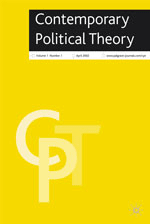
Contemporary Political Theory
Scope & Guideline
Challenging Conventional Wisdom in Contemporary Politics
Introduction
Aims and Scopes
- Interdisciplinary Engagement:
The journal promotes interdisciplinary approaches, drawing insights from philosophy, sociology, history, and cultural studies to enrich political theory. - Critical Examination of Power Structures:
A consistent focus on analyzing various power dynamics, including state authority, neoliberalism, and socio-political injustices, is evident in the published works. - Exploration of Democratic Practices:
The journal emphasizes the study of democracy in its various forms, including participatory democracy, deliberative practices, and the challenges posed by populism and authoritarianism. - Thematic Diversity:
A wide range of themes is covered, from feminist and decolonial theories to environmental politics and the implications of digital technology on democracy. - Historical and Contemporary Contextualization:
Papers often contextualize political theories within both historical frameworks and contemporary crises, facilitating a deeper understanding of ongoing social and political challenges.
Trending and Emerging
- Decolonial and Anti-Colonial Theories:
There is a marked rise in works addressing decolonization, indigenous rights, and anti-colonial frameworks, reflecting a growing commitment to addressing historical injustices and contemporary implications. - Intersectionality and Feminist Perspectives:
The journal has seen an increase in feminist theories, particularly those that incorporate intersectional analyses, addressing the complexities of gender, race, and class in political contexts. - Digital Democracy and Algorithmic Governance:
Emerging discussions focus on the implications of digital technologies for democratic practices, including algorithmic governance and the challenges posed by surveillance capitalism. - Environmental Political Theory:
The urgency of climate change and environmental degradation has led to a burgeoning discourse on environmental political theories, emphasizing sustainability and ecological justice. - Populism and Democratic Resilience:
Recent publications increasingly explore the phenomenon of populism, its impact on democratic institutions, and strategies for sustaining democratic resilience in the face of populist threats.
Declining or Waning
- Traditional Liberalism:
There appears to be a waning interest in classical liberalism as a standalone framework, with more focus shifting towards critiques of liberalism and explorations of alternative political ideologies. - Eurocentrism in Political Theory:
Discussions rooted in Eurocentric perspectives seem to be declining, as the journal increasingly embraces global and postcolonial viewpoints. - Theoretical Abstractions without Practical Application:
There is a noticeable decrease in papers that engage with purely theoretical abstractions that lack direct applicability to contemporary political issues, reflecting a preference for more grounded analyses.
Similar Journals
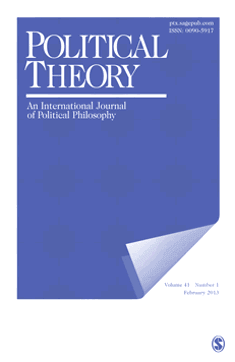
POLITICAL THEORY
Fostering Insightful Dialogue on Contemporary IssuesPOLITICAL THEORY, published by SAGE Publications Inc., is a premier academic journal that stands at the intersection of history, sociology, and political science. With an impactful presence since its inception in 1973, it has been a vital platform for scholarly discourse, advancing theoretical frameworks and empirical studies that invite critical engagement with contemporary political issues. The journal boasts a distinguished Q1 ranking in both History and Sociology and Political Science, reflecting its significance and influence within the academic community. Its rigorous peer-review process ensures that only the most innovative and insightful research is published, appealing to researchers, professionals, and students alike. Although not an open-access journal, its extensive contributions are accessible through a variety of academic databases, making it a crucial resource for those seeking to deepen their understanding of political theory and its applications. With an evolving scope that addresses pressing global challenges, POLITICAL THEORY remains an essential read for anyone invested in the complexities of political thought and historical context.
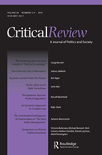
CRITICAL REVIEW
Advancing Critical Discourse in Literature and TheoryCRITICAL REVIEW is a prestigious academic journal published by Routledge Journals, Taylor & Francis Ltd, renowned for its contributions to the fields of Literature and Literary Theory and Political Science and International Relations. Established in 1986, the journal has become a pivotal platform for scholarly discourse, rigorously peer-reviewed articles, and critical essays, reflecting the evolving landscape of literature and politics. With an impressive Q1 quartile ranking in Literature and Literary Theory, it ranks in the 95th percentile of its field, underscoring its significance and influence among researchers and academics. Authors and readers engage deeply with contemporary issues through the lens of literary critique and theoretical exploration. While the journal is not open access, its esteemed content is accessible to institutions and individual subscribers, promoting quality research output. The journal's commitment to fostering interdisciplinary dialogue makes it an essential resource for students, educators, and professionals aiming to deepen their understanding of the intricate connections between literature and socio-political contexts.
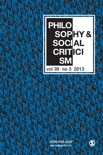
PHILOSOPHY & SOCIAL CRITICISM
Advancing Critical Dialogue on Contemporary Issues.PHILOSOPHY & SOCIAL CRITICISM, published by SAGE Publications Inc, stands as a pivotal platform for high-quality scholarly discourse, bridging the realms of philosophy and social theory. Since its inception in 1973, this esteemed journal has evolved to encompass provocative analyses and critical examinations of social issues, thereby playing an influential role in shaping contemporary philosophical thought. With an impressive Q1 ranking in the field of philosophy and a Q2 ranking in sociology and political science for 2023, it attracts contributions from leading academics and thought leaders. The journal, which spans topics of significance from the philosophies of ethics to the socio-political landscapes of modernity, provides crucial insights that inform both research and practical applications. Although currently not an open access journal, it offers robust access options through institutional subscriptions, ensuring its wide availability within the academic community. By engaging with the interdisciplinary dialogue fostered in its pages, researchers, professionals, and students alike can benefit from the rich academic exchange that PHILOSOPHY & SOCIAL CRITICISM facilitates, solidifying its importance in the scholarly landscape.

Filosofia Politica
Advancing Interdisciplinary Insights in Philosophy and PoliticsFilosofia Politica is a prestigious academic journal published by SOC ED IL MULINO, specializing in the interdisciplinary fields of Philosophy, History, and Political Science. Established to foster rigorous scholarly debate and inquiry, this journal serves as a significant platform for researchers, professionals, and students committed to exploring the complexities of political thought and socio-political history. With an ISSN of 0394-7297 and a remarkable convergence period stretching from 2012 to 2024, it has successfully carved out its niche, evidenced by its Q2 ranking in both History and Philosophy and a Q3 ranking in Sociology and Political Science for 2023. Its Scopus rankings further underscore its commitment to quality, positioning it within the top percentile of its categories. While currently non-open access, the journal provides a wealth of scholarly works geared towards deepening the understanding of political philosophies and societal dynamics, making it an essential resource for anyone committed to advancing knowledge in these vital areas.

Hybris-Revista de Filosofia
Unveiling Diverse Philosophical ParadigmsHybris-Revista de Filosofia, published by the CENTRO ALTOS ESTUDIOS FILOSOFICOS & CIENCIAS SOCIALES-CENALTES in Santiago, Chile, is a premier open-access journal dedicated to the exploration and advancement of philosophical thought and interdisciplinary dialogue. Established in 2009, the journal provides a vibrant platform for original research articles, critiques, and essays that delve into various philosophical paradigms, encouraging contributions from scholars across the globe. As an open-access journal, Hybris ensures that its scholarly content is freely accessible, promoting the dissemination of knowledge and fostering collaboration among researchers, professionals, and students alike. With an emphasis on innovative ideas and diverse perspectives in philosophy, Hybris plays a pivotal role in shaping contemporary discourse and is an essential resource for anyone interested in the evolving landscape of philosophical inquiry.
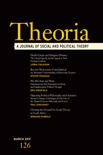
THEORIA
Advancing Knowledge Through Theoretical Insights.THEORIA is a distinguished academic journal focused on the intersection of theory and practice within the humanities and social sciences. Published by Berghahn Journals, this Open Access journal has been a pivotal platform for disseminating innovative research since 2021, ensuring that scholarly work is accessible to a global audience. With its commitment to fostering intellectual discourse, THEORIA invites contributions that critically explore diverse theoretical frameworks and their applications in contemporary societal contexts. Researchers, professionals, and students will find that the journal not only enriches their understanding but also encourages collaborative dialogue across disciplines. Explore the latest insights and developments in theoretical research, and join a vibrant community dedicated to advancing knowledge and critical thinking.
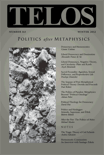
Telos
Advancing interdisciplinary dialogue in cultural studies and beyond.Telos is a leading academic journal published by TELOS PRESS LTD, specializing in the interdisciplinary fields of cultural studies, philosophy, sociology, and political science. With an ISSN of 0090-6514 and E-ISSN 1940-459X, Telos has carved out a significant niche in contemporary discourse, providing a platform for critical analysis and innovative thought. The journal, based in the United States, has demonstrated its impact through its classification in the Q2 category for both cultural studies and philosophy, and is recognized within the Q3 category in sociology and political science. Its Scopus rankings further affirm its influence in the academic community, emphasizing its commitment to advancing scholarly debate and engagement. Although not an open-access publication, it fosters a rich environment for researchers, professionals, and students seeking to explore the intersections of culture, ideology, and social structures. With converged years from 2010 to 2024, Telos remains a pivotal repository of knowledge and a catalyst for dialogue in the humanities and social sciences.

Interpretation-A Journal of Political Philosophy
Illuminating the Intersections of Thought and PowerInterpretation - A Journal of Political Philosophy, published by INTERPRETATION, INC, serves as a pivotal forum for scholars and practitioners alike to explore the nuanced intersections of philosophy and political theory. This esteemed journal, bearing the ISSN 0020-9635, has been instrumental in advancing discourse in the field, particularly during its coverage from 2002 to 2018. Although access options remain conventional, the journal's robust contributions to arts and humanities, alongside its insightful pieces in sociology and political science, ensure its relevance despite the discontinuation of indexing in Scopus. With its ranking within the lower percentiles in both philosophy and political science, Interpretation continues to challenge emerging thinkers to critically engage with fundamental political questions. It stands as a significant resource for researchers, professionals, and students dedicated to enriching their understanding of the philosophical underpinnings that shape political discourse.
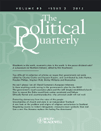
POLITICAL QUARTERLY
Navigating the Complexities of Society and GovernancePOLITICAL QUARTERLY, published by Wiley, is a premier scholarly journal that has been at the forefront of political science and sociology since its inception in 1930. With an ISSN of 0032-3179 and an E-ISSN of 1467-923X, this esteemed journal boasts an impressive Q1 ranking in both the Sociology and Political Science categories as per the latest metrics. Positioned within the top 81st percentile of social sciences, it ranks #271 out of 1466 journals listed in this field according to Scopus. The journal publishes a diverse range of articles that explore critical political theories, empirical research, and contemporary societal issues, making it a vital resource for researchers, professionals, and students alike. While not currently offering open access, POLITICAL QUARTERLY remains committed to advancing knowledge and fostering scholarly dialogue within its disciplines. Located in the United Kingdom at 111 River St, Hoboken 07030-5774, NJ, it continues to shape discourse on political and social dynamics into its upcoming 2024 volume.

Annual Review of Political Science
Empowering Scholars with In-Depth AnalysesAnnual Review of Political Science is a premier academic journal dedicated to the systematic examination of the evolving field of political science. Published by ANNUAL REVIEWS, this journal serves as a vital resource for scholars, researchers, and students alike, featuring comprehensive reviews and critical analyses of the latest advancements in political theory, comparative politics, international relations, and public policy. With an impressive impact factor and ranked in the top 10 percentile of its category, it holds a distinguished position within the Q1 quartile for both Sociology and Political Science as of 2023. Since its inception in 1998, the journal has converged a wealth of knowledge and expertise, making significant contributions to understanding complex political dynamics worldwide. While it is not an open-access journal, its curated content is essential for anyone aiming to stay informed in the rapidly changing landscape of political science.